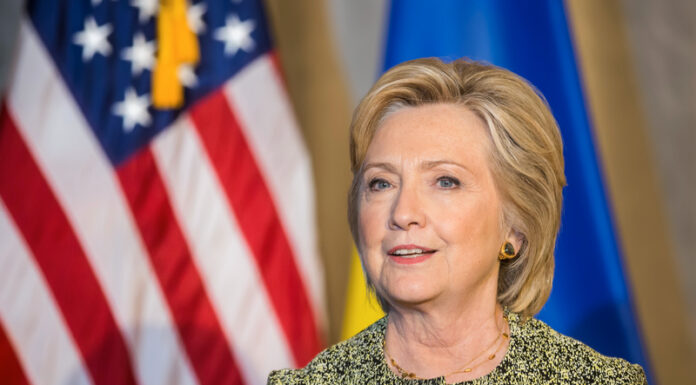Former Secretary of State, Hillary Clinton, has expressed concerns over an imminent disinformation campaign targeting Vice President Kamala Harris. Clinton revealed her apprehensions during an interview with Firing Line host Margaret Hoover this month.
Clinton explained that there may be an escalation in attempts to tarnish Harris’ public image. She referred to this as an “October surprise,” insinuating that it would aim to “distort and pervert Kamala Harris” in a bid to manipulate public sentiment ahead of the election.
She further indicated that such a campaign could involve a concerted disinformation strategy intended to misrepresent Harris’ record and character. Using her experience from the 2016 presidential election as a reference, Clinton highlighted that these ploys often revolve around conspiracy theories and false narratives intended to harm the reputations of political figures. She stated that as a prominent figure, Vice President Harris could be a significant target leading up to Election Day.
Clinton brought up the now-discredited “Pizzagate” conspiracy theory to exemplify the potential reach and harm of disinformation. She was falsely accused in 2016 of orchestrating a child trafficking ring from a pizzeria in Washington, D.C. This unfounded story gained momentum through social media and fringe websites, eventually leading a man from North Carolina to the pizza parlor armed with an assault rifle, intending to “rescue” non-existent children.
This incident underscores the real-world dangers of rampant misinformation. Clinton used this case to demonstrate how quickly untruths can escalate, cautioning that a similar disinformation campaign could target Harris in the run-up to the 2024 election. She urged the audience not to underestimate the potential impact of such lies.
Active dissemination of these conspiracy theories is often facilitated by social media platforms and fringe news sites. Clinton explained that it starts in the obscure corners of the internet, often on the dark web, and then seeps into mainstream discourse. Once these stories are picked up by partisan media outlets, they can rapidly reach a wider audience, gaining an undeserved level of credibility.
Clinton’s concerns extend beyond domestic misinformation. She also brought up the possibility of foreign interference in the 2024 election, mirroring worries expressed by cybersecurity experts in recent years. Countries like Russia, Iran, and China could exploit social media to propagate false narratives about candidates, including Harris. Clinton predicted a surge in misinformation on digital platforms and stressed the importance of remaining vigilant.
During the 2016 election, Russian operatives used social media platforms to amplify divisive narratives and disinformation campaigns aimed at undermining trust in the voting process. Clinton suggested that similar tactics could be used now, with foreign actors potentially pushing narratives specifically targeting Harris. While she called on social media platforms to actively monitor and control the spread of disinformation, she also stressed the role of media in maintaining a consistent narrative about the risks posed by false information.
Clinton called on journalists to remain diligent in their fact-checking efforts and proactive in debunking misinformation before it gains wide acceptance. She urged the public to remain skeptical of outrageous claims, especially those designed to incite fear or doubt.
Clinton admitted uncertainty about the specific form that the disinformation campaign against Harris might take but expressed certainty that something will surface. She urged voters, the media, and political leaders to stay alert and be ready to counter any false narratives that may emerge.
Referring to “October surprises” as last-minute revelations or scandals influencing election outcomes, Clinton suggested that Harris could be particularly vulnerable to disinformation campaigns that exploit biases and attempt to create division among voters. These efforts could be part of a broader strategy to destabilize the political landscape by emphasizing Harris’s race, gender, or past political record.
Clinton’s remarks come at a critical time as the 2024 election approaches and concerns about disinformation continue to escalate. Recent elections in the U.S. and around the world have demonstrated the powerful and pervasive influence false information can have on public opinion and voter behavior.
A recent CBS News report detailed a disinformation campaign against Vice President Harris, led by actors linked to Russia. Tactics include fabricated videos falsely accusing Harris of involvement in a hit-and-run accident, with Iranian and Chinese groups also participating to disrupt the U.S. elections.
A video posted on social media in September attracted millions of views. The video showed a young Black woman accusing Vice President Harris of causing her paralysis in a hit-and-run accident in San Francisco, California, 13 years ago. However, social media users quickly pointed out inconsistencies, and a Microsoft threat intelligence report confirmed that the story was disinformation from a Russia-linked troll farm.
Clinton, reflecting on her own experience in 2016, said, “We’ve seen it before, and we’re seeing it again.” She emphasized the dangerous nature of these tactics, urging all Americans to remain vigilant against attempts to manipulate the truth.








